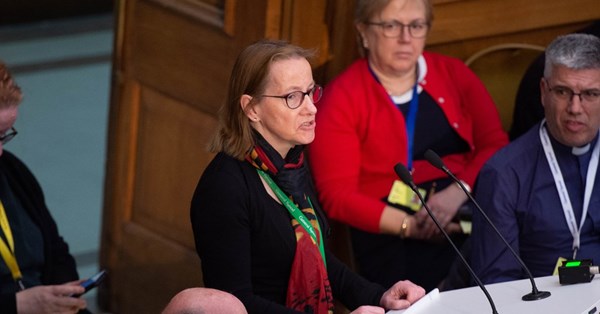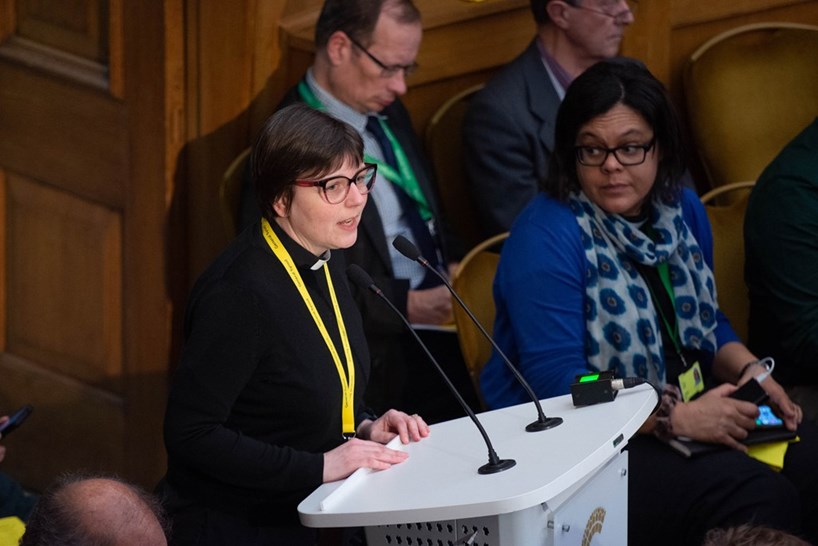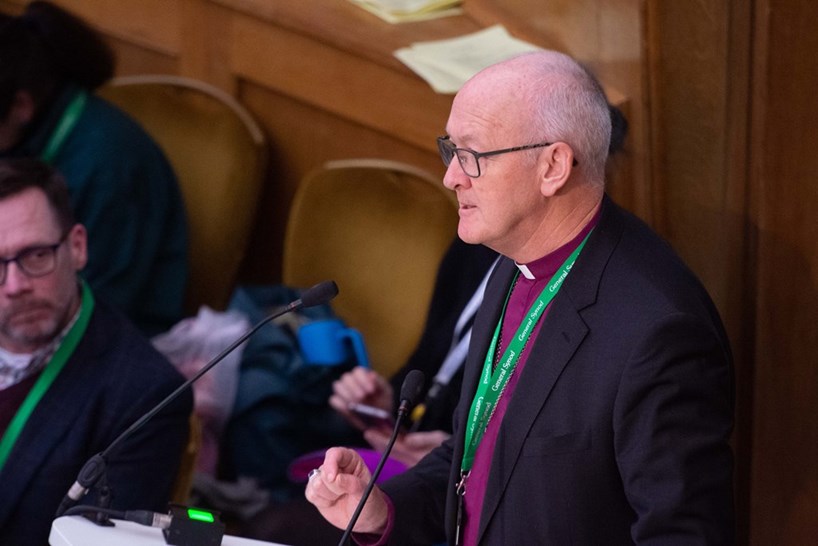
THREE pieces of legislative business came to the General Synod on the Monday afternoon. Draft Amending Canon 42 on Safeguarding; the Draft Diocesan Stipends Fund (Amendment) Measure; and the Draft Church of England Pensions (Application of Capital Funds) Measure were all at the revision stage and reached the final stage on the Thursday afternoon.
Moving the first motion, the Ven. Nicola Groarke (Worcester) explained that the Independent Inquiry into Child Sexual Abuse (IICSA) recommended creating the post of diocesan safeguarding officer, to replace that of safeguarding adviser. The officer would have the authority to make decisions independently of the diocesan bishop in respect of key safeguarding tasks, would be employed locally by the diocesan board of finance, and their work would be professionally supervised and quality assured by the National Safeguarding Team (NST).
This was carried without debate, thus completing the revision stage.
The purpose of the Diocesan Stipends Funds (Amendment) Measure is to enable dioceses with historic wealth to give financial help to those without, transferring money through the diocesan stipends fund. Moving the motion, Geoffrey Tattersall (Manchester), who chairs the revision committee, explained that the committee had favoured a permissive rather than prescriptive approach: the wording would enable dioceses to be generous, while providing all the financial checks and balances.
Clive Billenness (Europe) recommended the creation of standard accounting procedure for the point at which the money was transferred.
The Bishop of Burnley, the Rt Revd Philip North (Northern Suffragans), hoped that the Measure would act as an honest broker, preventing poorer dioceses having to crawl to richer ones.
Dr Ian Johnston (Portsmouth) was opposed, describing the proposal as well-intentioned but misguided, something to “salve our consciences”. He suggested that it went against Charity Commission guidelines, broke the ring fence, and removed incentives to correct weaknesses that a parish might have. The problem was the imbalance of resources in the dioceses. “We need to be more holistic, putting the well-being of parishes at the heart,” he said.
Karen Czapiewski (Gloucester) suggested that something reflecting intentionality would be appropriate.
The Synod took note of the report.
Andrew Orange (Winchester) moved an amendment to make the Measure “fireproof” by requiring the entire diocesan synod to approve the diocesan board of finance’s (DBF’s) transfer of money. This would ensure that it was “insiders” who gave it final approval, he said. The Measure did not specify which members of a DBF or smaller group would approve it. This would add “democracy and clarity”.
The Bishop of Sheffield, the Rt Revd Pete Wilcox, who chairs the steering committee, urged the Synod to resist the amendment. Safeguards were already built into the Measure; decisions made by a DBF were already subject to scrutiny; it was important to take as much friction out of the process as possible. This was “an unhelpful and complicating step”.
A close show of hands on the amendment necessitated a counted vote, and it was lost by 158-128, with nine recorded abstentions.
The Synod completed a clause-by-clause revision of the Draft Measure.
The revision of the Draft Church of England Pensions (Application of Capital Funds) Measure was moved by Busola Sodeinde (London). It seeks to extend, until 31 December 2032, the period within which the Church Commissioners may make capital payments towards the cost of lump sums and pensions payable under certain pension and superannuation schemes.
The Synod took its four clauses en bloc and the Draft Measure went briskly forward for final approval, with no debate.
ON THE Thursday afternoon, later than scheduled, owing to the overrunning of the debate on Living in Love and Faith, the Synod gave final approval to the Diocesan Stipend Funds (Amendment) Measure. Commending it for final approval, Bishop Wilcox said that, in a poorly attended session, members still had spirited contributions to make.
 The Revd Eleanor Robertshaw (Sheffield)
The Revd Eleanor Robertshaw (Sheffield)
Julie Dziegiel (Oxford) said that her diocese was well aware of its own wealth, which was why it had pledged £250,000 every year for four years. “But it would be sad if the only diocese doing this was Oxford, which isn’t actually the wealthiest,” she said. “Lincoln and Coventry are among the top quarter, [which also includes] Ely, Gloucester, Norwich, Peterborough, and Worcester. At the end of 2020, their Diocesan Stipend Funds stood at £50 per person. In the the bottom quarter, the figure was less than £5.” Oxford’s actions were “small steps towards fairer finance in our Church”.
Robert McNeil-Wilson (Gloucester) said that funding needed addressing urgently: that there were “serious shortcomings” in the current system, which failed to address the root causes. Some parishes had failed to manage their finances effectively, and too many had funds that were totally inadequate, he said. “We need a national rebalancing of our funds in favour of parishes.”
The top ten dioceses had between £50 million and £96 million each, he noted. Transfer of funds from the Church Commissioners could lift all dioceses to an average of £50 million, he suggested, “promoting all of them to the Premier League at a stroke”. The Archbishop of York had spoken of plans to revitalise the parish system: “If we took this opportunity radically, one decision could arrest and reverse the drastic decline in clergy numbers, and parishes being told they don’t merit a priest,” Mr McNeil-Wilson said.
The Revd Eleanor Robertshaw (Sheffield) was frustrated at the Church of England’s ability “to do things 42 different ways” and, noting empty seats in the chamber, asked: “Where are people this afternoon? We are not a one-issue Synod.”
Dr Ian Johnston (Portsmouth) apologised that he was about to “hammer the points in. This [Measure] is very generous, but it is tinkering around the edges of much larger problem, a sticking-plaster. We are not solving the fundamental problems of our dioceses. We need a fundamental revision: a look again at how our dioceses work, within them and between them.”
Mr Orange described the Measure as something of a “leaky bucket”, while recognising the possibility for dioceses to be generous to one another. “They think the money they have is theirs. It isn’t: it’s from parishes. This risks being a case of dioceses’ being generous with other people’s money.”
Andrew Dotchin (St Edmundsbury & Ipswich) suggested that Oxford was being “a living parable”. He urged support.
Mr Spence recognised the frustrations and said: “No, we can’t afford 42 head offices, all operating independently. But there are initiatives under way. Three regional bodies are coming together on this, and we continue to work with this group.” He reminded the Synod that every diocese was a charity, and the origins of the fund did not remove the legal responsibilities of trustees. “We are doing what we can to further accelerate and incentivise our thinking on the issue.”
 Geoff Crawford/Church TimesThe Bishop of Leeds, the Rt Revd Nick Baines, on the Thursday afternoon
Geoff Crawford/Church TimesThe Bishop of Leeds, the Rt Revd Nick Baines, on the Thursday afternoon
The Bishop of Leeds, the Rt Revd Nick Baines, reminded Synod members: “For 50 years, we’ve been mucking about, trying to get dioceses to share services. We’ve done it in Leeds. . . Start with what we have already done, and learn from it.”
The final-approval voting was Bishops 26 nem. con.; Clergy 97-1, with three recorded abstentions; Laity 115-11, with five recorded abstentions.
The Synod also gave final approval, without debate, to Amending Canon 42, which Archbishop Cottrell described as “a really important piece of work”. Voting was: Bishops 26 nem. con.; Clergy 92 nem. con., with four recorded abstentions; Laity 112-1, with five recorded abstentions.






